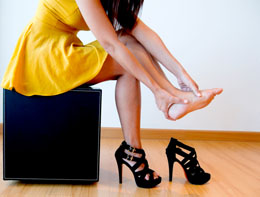Leg pain could be caused due to injuries, muscle pulls, joint problems, or poor circulation. This write-up provides information on the contributing factors for aching legs.

Traumatic injuries affecting the muscles, ligaments, tendons, nerves, or bones in the legs or repetitive stress injuries are often responsible for causing aching legs. Pain could also be caused due to certain medical conditions. It could be dull, sharp, constant, or intermittent. It may or may not be accompanied by swelling, weakness, numbness, or a tingling sensation.
Contributing Factors
Some of the common causes of leg pain include:
Trauma: One may experience pain, if a bone in the leg gets fractured or breaks. Overuse injuries could cause a simple stress fracture, whereas the bone might break through the skin in case of an open fracture. Pain might also be experienced in case the tendons or ligaments in the legs become inflamed.
Obesity: Since our legs are responsible for carrying our entire body weight when we walk, those who are obese could experience pain in their legs after standing for long stretches of time.
Sciatica: The sciatic nerve is the longest nerve in the human body that runs from the lower back through the buttocks and ends just below the knee. If this nerve gets irritated, one is likely to experience pain in their back or lower body. One might also experience numbness and tingling sensation.
Osteoarthritis: This is a degenerative joint disorder that occurs when the protective cartilage on the ends of the bones gets worn out with time. This causes the bones to rub against each other. When the knee and hip joints get affected, it could give rise swelling and pain in legs. Inflammatory conditions such as tendonitis and bursitis could also cause pain in the legs.
Peripheral Artery Disease: This condition occurs due to progressive atherosclerosis in the arteries of lower extremities. When the arteries become narrow and harden due to the build up of fatty deposits, the oxygen-rich blood is unable to reach the muscles and other tissues. This gives rise to pain and discomfort in the muscles of the feet, calves, or thighs while walking. These symptoms resolve with rest.
Deep Vein Thrombosis: This medical condition is associated with blood clotting in the deep venous system of the leg. The symptoms include swelling, inflammation, and pain in the affected leg.
Restless Leg Syndrome: People affected by this condition experience pain in the legs when lying down, especially at night. Affected individuals experience relief by keeping their legs in motion.
Besides the aforementioned conditions, medical conditions such as varicose veins, nocturnal leg cramps, diabetic neuropathy, fibromyalgia, herniated disc, hyperthyroidism, dehydration, and anemia could also cause pain in the legs.
Diagnosis and Treatment
Besides a physical examination, an X-ray examination is often conducted to check for any fractures or signs of trauma. If pain is caused due to injuries or fractures, the patient will have to wear a cast for speeding up the process of recovery. Rest, application of ice, compression, and elevation are an integral part of the treatment. Non-steroidal anti-inflammatory drugs might also be prescribed to alleviate the pain and swelling. If there are no signs of fracture or visible injuries, doctors will run some tests to ascertain the underlying cause and treatment options. Besides the use of medicines or physical therapy, alternative healing therapies such as acupressure, massage, and aromatherapy might also prove beneficial.
If you have been experiencing persistent pain in your legs, get yourself medically examined to ascertain if this pain is a symptom of a medical condition. Once the underlying cause is treated, pain would resolve on its own.
Disclaimer:
The information provided in this article is solely for educating the reader. It is not intended to be a substitute for the advice of a medical expert.


 Traumatic injuries affecting the muscles, ligaments, tendons, nerves, or bones in the legs or repetitive stress injuries are often responsible for causing aching legs. Pain could also be caused due to certain medical conditions. It could be dull, sharp, constant, or intermittent. It may or may not be accompanied by swelling, weakness, numbness, or a tingling sensation.
Traumatic injuries affecting the muscles, ligaments, tendons, nerves, or bones in the legs or repetitive stress injuries are often responsible for causing aching legs. Pain could also be caused due to certain medical conditions. It could be dull, sharp, constant, or intermittent. It may or may not be accompanied by swelling, weakness, numbness, or a tingling sensation.